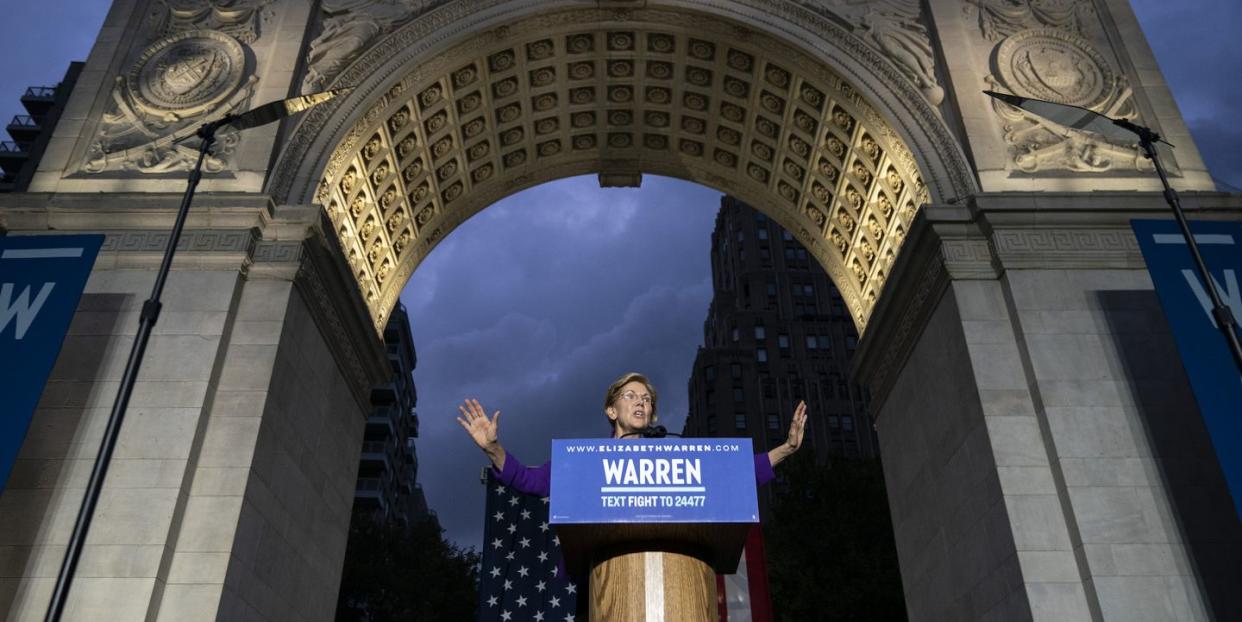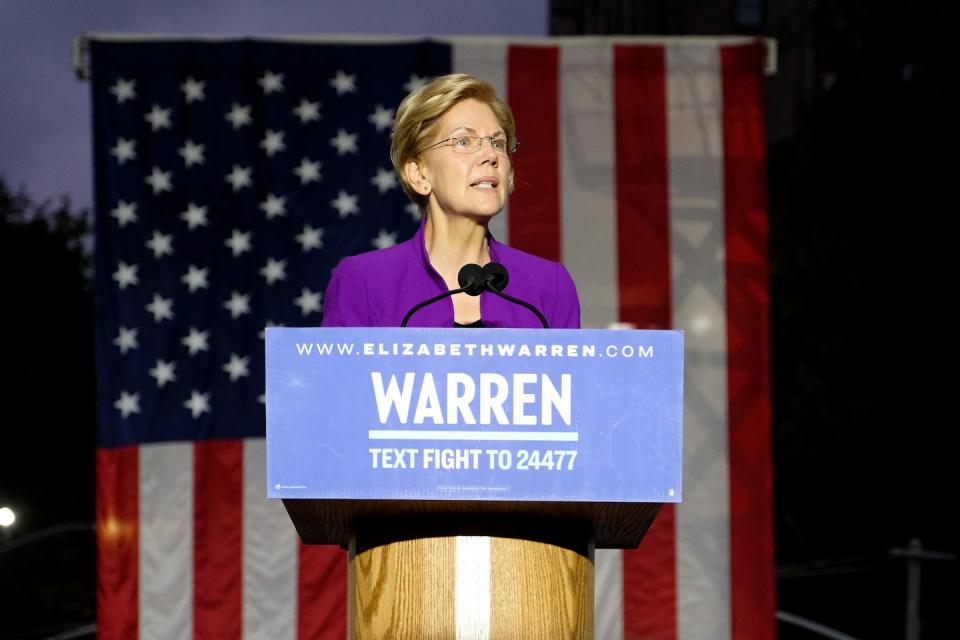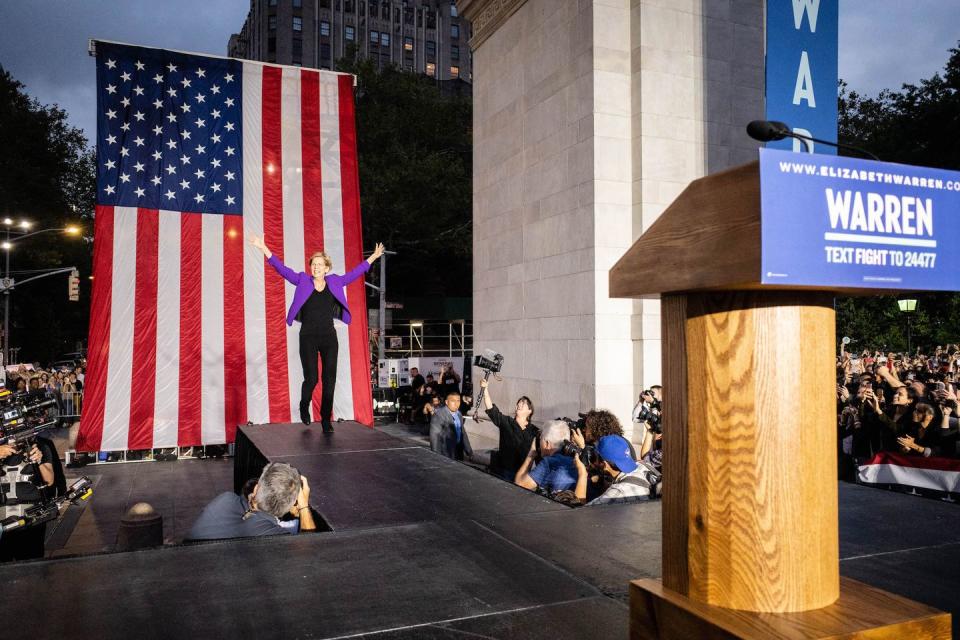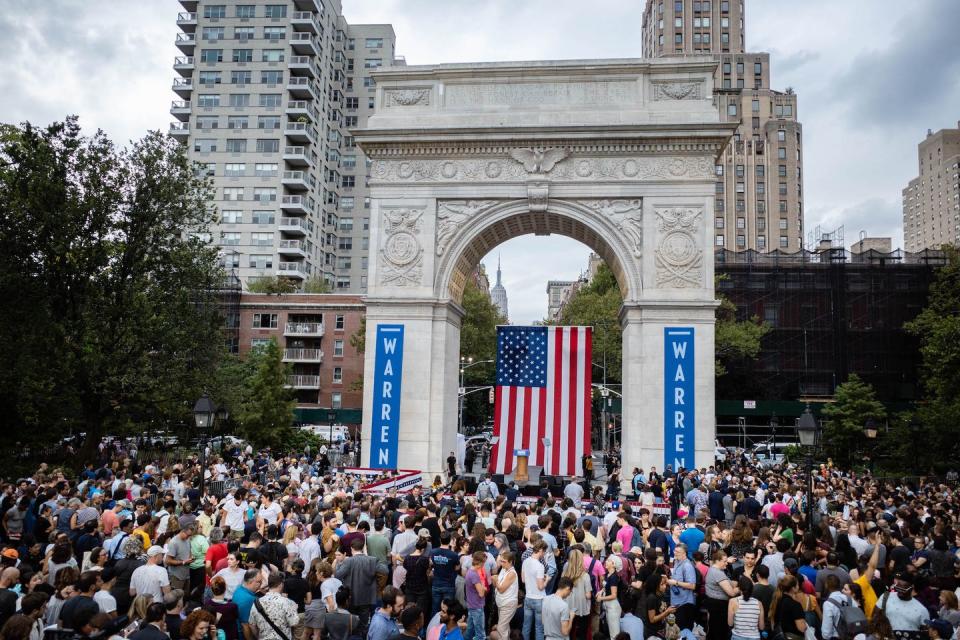Elizabeth Warren Declared War on Corruption in the Heart of Lower Manhattan

NEW YORK—Corruption is not merely unethical or undemocratic. It gets people killed. That was what Elizabeth Warren sought to illustrate to the many thousands who gathered Monday night to hear her speak beneath the towering marble arch in New York's Washington Square Park. The Massachusetts senator and Democratic candidate for president held her biggest rally of the campaign a block or so from the building that once housed the Triangle Shirtwaist Factory, the site of a 1911 fire that, in the space of 18 minutes, became the deadliest industrial disaster in the history of the city. 146 garment workers perished, mostly women and many of them new Italian and Jewish immigrants. They were locked in the facility to prevent unauthorized breaks or theft of materials, a standard practice of the time that condemned them to the inferno.
The fire was the opening and centerpiece of Warren's speech Monday night, because for her, the fire was about power. The appalling conditions in garment factories were widely publicized by the time of the Triangle atrocity, yet the industrial bosses had captured enough of city government to stop any kind of reform. Workers, many of them the most marginalized people in society, were subjected to excruciating hours and horrific conditions and inadequate pay while the people up top made a killing. "Sound familiar?" Warren asked the crowd just after 7:30, and soon enough she was off to the races, regaling the crowd—which her campaign said numbered at least 20,000, though that was not independently verified—with all the familiarities.

"Giant corporations have bought off our government," she told the crowd to boos and cheers. She listed off the offenders: fossil fuel companies, the gun lobby, health insurance companies, drug companies. She spoke in plain terms about the current state of lobbying in this country: "It's the very definition of bribery," she declared, her voice rising, "and we're going to put a stop to it." For this, she said, she had a plan—"the biggest anti-corruption plan since Watergate," featuring a lifetime ban on lobbying for federal officials like senators or congressmen or Cabinet members. Warren wants every meeting between a lobbyist and a politician on the record, so constituents can know who's got their representative's ear. She wants anyone who enters public life to give up their private business interests while they serve.
"Take care of the people's business or your own business," she said, "but you can't do both at the same time." It wasn't hard to decipher who had entered the piece. "Donald Trump," Warren said simply, "is corruption in the flesh."
It's this combination of detailed policymaking and straight-and-simple communication that has drawn people towards Warren's campaign in growing numbers, even if she and Bernie Sanders still consistently trail Joe Biden in Democratic primary polling. Many of the rallygoers cited Warren's ability to make complicated things simple, at least on the stump, as fundamental to her appeal.
"She explains things really well," Josh, who works in publishing in New York, told me as Tom Petty belted over the speakers in the run-up to the event. "She has ideas, but she knows how to get them across. You can tell that she was a schoolteacher, and you can tell that she was a professor."
Dominic, a med student who'd come with him, cited The Plans: "They’re value-based plans, but they don’t just have the overarching values," he said. "She has the details to get there."
And Warren did produce the plans. She ticked through her proposals on campaign-finance reform, and student debt, and affordable college, and universal healthcare. The senator wove each into her larger narrative of big money and regulatory capture, painting the picture of an American political system paralyzed by interests who can subvert the will of the public for their own ends. She introduced each with a knowing, "but wait, there's more," or "and that's not all," nodding every time to this connection she has with her supporters. She has done her homework, and they trust her because of it. It's about time there was somebody around here who did the reading. It was part of Warren's broader looseness on the stump, where she's far more Oklahoma Folks than staid Harvard professor.

“I just appreciate that she’s so transparent, and it’s actually easy to understand the plans she has for the country," said Andrea, who works in product development. "She just wants the best for the American people."
Not everyone in attendance was a supporter, though. Many were just getting acquainted with Warren, or were far from making a decision with the actual voting so unbelievably far away. The American political system continues to astound in its ability to engineer endless campaigns with only the occasional election. Some who showed up had real doubts.
"I don’t think one term is enough for her to not only get her plans rolling, but be able to rally support from both sides of the aisle," said Hamza Qureshi, a pre-med studying biochemical engineering at NYU, before the speech. "That’s what I’m worried about." He said he was also looking at Amy Klobuchar and Pete Buttigieg, whose plans he found more realistic. "You have to start small and build up."
About an hour later, Warren seemed determined to answer the calls for pragmatism and incremental change directly. "We can't choose a candidate we don't believe in just because we're too scared to do anything else," she said. "And Democrats can’t win if we’re scared and looking backward."

It was a nod to the Electability argument so often cited among supporters of Biden. The former vice president under Barack Obama has a thus-far comfortable lead in the polls, running on a platform whose main plank is that he was vice president under Barack Obama. His core strength, however, is that many Democrats perceive him as the best candidate to win back the white-guys-in-diners vote, perhaps the result of 14,000 articles over the last few years about how this is the single key slice of the broader American electorate, of which 56 percent actually took part in the 2016 election. Donald Trump is a singular danger to the American republic, Biden tells the country with good reason, but we can save ourselves if we just get rid of him and go back to normal. It was certainly a priority for some here.
"My primary issue is changing who’s in charge now, and figuring out the best person to do that," said Scott Barbarino, who was born and raised in Brooklyn but is now in Manhattan. He's an entertainment coordinator for a Midtown restaurant, and later offered his assessment of the lighting (it was good) and the music (it was sometimes incongruous with the moment). "All the other issues will fall into place, hopefully, once the right person’s there and actually listens to what people are asking. Which is a change."
But Warren's fundamental message is that Donald Trump is a symptom, not a cause, of our national malaise, the ugliest manifestation of a body politic that surrendered to desperation and despair in the face of the almighty money power. Trump is no reformer—he is a destroyer of things, a brutal opportunist who pilfers from the wreckage. Sanders asserts that the Trump problem can only be addressed through more fundamental changes to our political economy, and Warren seems to agree. One of her emerging slogans, along with, "Dream Big. Fight Hard," is "Big, Structural Change." Warren is developing an inside-out strategy that she modeled here on Frances Perkins, who led reform efforts after the Triangle fire before rising to become the nation's first woman Secretary of Labor under Franklin Delano Roosevelt.
“She used the same model that she and her friends had used after the Triangle fire," Warren said of Perkins' successful efforts to secure a minimum wage and Social Security. "She worked the political system relentlessly from the inside while a sustained movement applied pressure from the outside."

It was this kind of sustained outside energy that was lacking in the Obama years, when the optimism of Hope and Change crashed against the entrenched interests of our political system and subsequent waves never harnessed the same energy. The specter of the 44th president loomed here as it had at the Democratic debate last week, while today's Democrats try to reconcile the party's love for Obama while gingerly assessing the shortcomings of his record. More than one of the speakers here, including Working Families' Party National Director Maurice Mitchell, referenced "kids in cages" in their attacks on Trump's immigration policies, and there is no doubt that they have been brutally and purposefully inhumane. But while Obama did not separate children from their parents for illegal border crossing—a misdemeanor—it was his administration that built the cage facilities for unaccompanied minors.
Needless to say, that went unsaid. But Warren's movement rhetoric, like Sanders', is a shadow criticism of the Obama years. In the end, they believe his closer ties to establishment political institutions and inability to keep his supporters mobilized made him a more reliable friend to entrenched interests. Some of Sanders' supporters might level the same thing at Warren.
"I’m not quite sure about Elizabeth in the sense—I know she’s very close to the policies that Bernie’s been talking about," said Nigel, an Australian here with his wife, Lata. Their daughter works in the U.S. "But he’s been consistently talking about it and there is a movement behind him. With Elizabeth, she’s just a presidential candidate. I don’t think she’s going to build up the base as much as Bernie Sanders."
The attacks on Warren from the Sanders camp are likely to ratchet up now she's established some durability in the polls and, just on Monday, secured the endorsement of the Working Families' Party, which backed Sanders in 2016. At Thursday's debate, the two did not yet go toe-to-toe for the populist lane, but the confrontation is coming. It could be to Biden's benefit, and that will certainly bring a better night's sleep for Warren's growing list of enemies. The hosts on CNBC have taken to ringing the alarm bells about a potential President Warren, and sharing the fears of Wall Street bigwigs about her rising candidacy.
It was fitting, then, that she spoke at Washington Square Park in the heart of Greenwich Village. This was once the beating heart at the center of the counterculture, where grassroots activists once defeated Robert Moses in his attempt to slice a street through the park. But Warren delivered her speech in what is now one of the world's most expensive zip codes, surrounded in the distance by towering monuments to the daunting power of the American financial machine. She will face an almighty battle just to secure the Democratic nomination, and then she would square off against a vicious know-nothing who is quite literally capable of anything. And then, only then, would she have the opportunity to wage war on the money power that has spread its tentacles wide and deep in our politics. Her message here, however, was simple as ever.
"I am not afraid."
You Might Also Like

